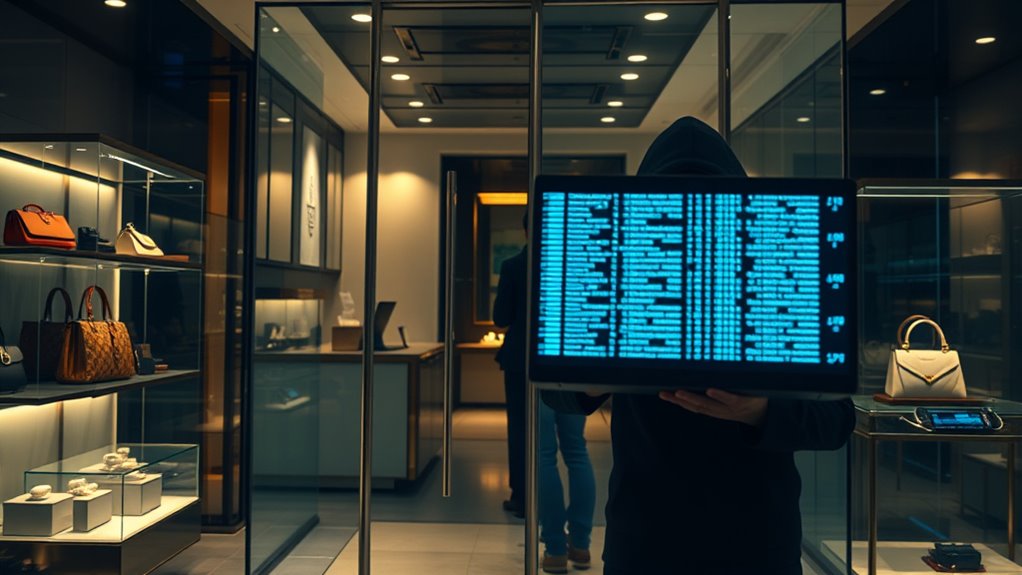Recent cyberattacks on luxury brands like Cartier, Louis Vuitton, and Kering have exposed customer personal data such as names, emails, and locations, though financial details often remain safe. Hackers target vulnerabilities in internal systems and third-party vendors, increasing the risk of scams and identity theft. Brands respond quickly by notifying authorities and improving security measures. If you want to understand how these breaches happen and what’s being done, keep exploring further.

Have you ever wondered how secure your luxury brand purchases really are? Recent events show that even the most prestigious brands aren’t immune to cyberattacks, putting your personal information at risk. In June 2025, Cartier disclosed a data breach that exposed customer names, emails, some account details, and country of residence. Importantly, no financial or payment information was affected, but the breach still raises concerns about the safety of your personal data. Cartier acted quickly, containing the breach, notifying authorities, and bringing in external cybersecurity experts. They haven’t confirmed ransomware involvement, but the incident highlights the vulnerabilities even in highly protected environments. Recent retail breaches have increased cybersecurity risks for high-end brands. Additionally, many brands are now investing in hydrotherapy as a form of employee wellness to combat stress, which can be a factor in cybersecurity lapses.
Meanwhile, Louis Vuitton faced multiple breaches across different countries between June and July 2025. In Turkey, unauthorized access via a third-party service provider’s account affected nearly 143,000 customers’ personal data, revealing names, emails, and geographic locations. Similar breaches occurred in South Korea and the UK, although it’s unclear whether these incidents are connected. LVMH, Louis Vuitton’s parent company, confirmed ongoing investigations and warned customers to be cautious of suspicious activity. This scattered pattern of breaches shows how cybercriminals exploit weaknesses in supply chains and third-party vendors to access customer data.
Adding to the concern, the Kering Group, which owns brands like Gucci, Balenciaga, and Alexander McQueen, suffered a significant cyberattack that compromised customer information across multiple brands. The attack targeted internal systems, exposing sensitive consumer data and exposing vulnerabilities within the luxury retail supply chain. Experts warn that cybercriminals are increasingly using AI tools to enhance their attacks, making these breaches even more dangerous. The incident has sparked widespread worries about data privacy in the luxury market, especially as more brands expand their digital footprint.
What types of personal data are most often exposed? Typically, your name, email address, and geographic location are the main targets. Some breaches reveal account details but avoid financial or credit card information, reducing immediate financial risk. Still, the exposure of personal contact details can lead to phishing scams, targeted scams, and other malicious activities. Once your data is exposed, regulatory agencies often step in, prompting brands to notify affected customers and improve security measures. Brands respond by deploying containment strategies, informing customers, and engaging cybersecurity firms for forensic analysis. Many are also working to tighten internal security and manage third-party vulnerabilities.
These breaches aren’t isolated to a single region—they span Europe, Asia, and the Middle East, affecting flagship markets like the UK, South Korea, and Turkey. Cybercriminals exploit operational weaknesses across borders, emphasizing the need for stronger, unified data protection policies. As these incidents continue, it’s clear that your personal information remains vulnerable, even when dealing with luxury brands known for their exclusivity. Staying vigilant and cautious is more important than ever if you want to protect yourself from falling victim to these increasingly sophisticated attacks.
Frequently Asked Questions
How Long Did the Breach Go Unnoticed Before Discovery?
You notice that Dior’s American breach went unnoticed for about six months before discovery, from January 26 to July 2025. In contrast, the Asia-Pacific breach was detected on the same day it occurred, May 7, 2025. This delay in the U.S. likely increased the risk for affected customers, highlighting how detection times can vary depending on monitoring systems and regional regulations.
Were Any Financial Transactions Compromised During the Hack?
Not a single cent was stolen during these breaches—think of it as a fortress where your financial data remains untouched. Luxury brands, despite hacking incidents, have kept your payment info safe, focusing cybercriminals on personal details instead. They’ve segregated financial data, making it a vault that hackers can’t crack. So, rest assured, your transactions stay secure, and these breaches haven’t compromised your financial transactions or payment details.
What Specific Luxury Brands Were Affected by the Breach?
You’re affected by breaches across several luxury brands. Christian Dior Couture, Louis Vuitton, Gucci, Balenciaga, Brioni, Alexander McQueen, and Cartier all suffered data leaks. Louis Vuitton’s breaches hit South Korea, the UK, and Turkey, exposing customer info. Kering’s brands like Gucci and Balenciaga saw millions of records stolen, while Cartier’s breach revealed customer names and emails. These incidents highlight vulnerabilities even among top-tier brands, so stay alert for suspicious messages.
Have Affected Customers Been Notified Directly by the Brands?
Yes, affected customers have been notified directly by the brands. While Dior reached out to US customers starting in May 2025, Louis Vuitton promptly informed customers in South Korea, Turkey, and the UK in July 2025. Cartier disclosed the breach publicly but didn’t specify individual notifications. These brands prioritize transparency, using emails and press releases to inform customers about data exposure, emphasizing that financial info remains secure.
What Measures Are Brands Implementing to Prevent Future Hacks?
You should know that brands are implementing advanced security measures to prevent future hacks. They’re enhancing real-time monitoring, tightening access controls, and deploying sophisticated intrusion detection systems. They’re also conducting regular security audits and adopting zero-trust frameworks. Additionally, they’re strengthening supply chain security by vetting third-party vendors and enforcing strict cybersecurity standards. Employee training and fostering a security-first culture are also key steps to minimize vulnerabilities and improve overall cybersecurity resilience.
Conclusion
As you imagine the shimmering allure of luxury, think of it now shadowed by unseen breaches. Your personal info, once tucked safely behind velvet ropes, is now out in the open, like a flickering light in a darkened room. This breach isn’t just data slipping away — it’s your trust, your secure haven, fading into the night. Stay vigilant, because in this world of glamour, security should always be your shining armor.









